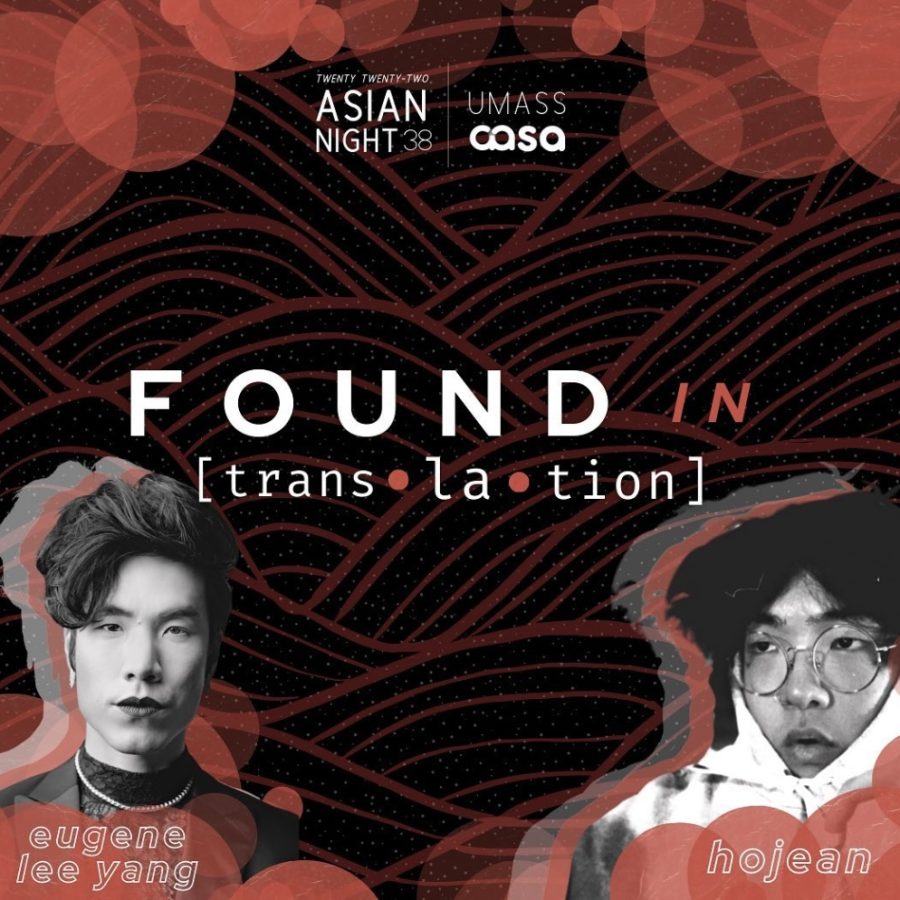On the evening of Sunday, April 10, the UMass Asian-American Student Association (AASA) held their 38th Asian Night, “Found in Translation.” This year’s event was poised to highlight the “beauty in our differences.” In contrast to portrayals and perceptions of Asians as a monolithic people, the Asian diaspora is a diverse and eclectic global community of many cultures. AASA Secretary, senior Anna Nguyen, feels the event “is a night that showcases Asian talents and is AASA’s way of giving back to the community, providing a free and accessible way for people to come and enjoy the hard work and excellence students and performers can bring to the table.” To Nguyen, building community means “providing a safe space for people to come and create new friendships and memories,” and AASA certainly accomplishes this and more with Asian Night.
Hosted at the Bromery Center for the Arts, “Found in Translation” marks the second major in-person event for AASA since their hugely successful “Into the Enchanted Forest” Winter Ball last semester. The line to enter extended all the way past the old Isenberg building, with enthusiastic supporters lining up early to win prizes ranging from Insomnia Cookies and high-end calligraphy pens to Gundam figures.
The event began at 7:00 p.m. and was slated for around a three-hour runtime. Asian-interest dance groups like Rice Paddy Heroes, KDC, 5:Dirty Crew, and +86 lit up the stage with original choreography, K-pop dance covers and hip hop freestyles. Proving a foundational thread in Asian culture, many generations of K-pop artists were represented through the dance covers from last decade’s global girl group 2NE1 to new generation leaders, IVE. The diabolo (Chinese yo-yo) and dragon choreography group, TASC, was a major standout with slick moves and edge-of-your-seat tricks.
Speaking with dancers from UMass Altitude’s 5:Dirty Crew and New England based Rice Paddy Heroes, they spoke about how they feel immensely proud of their Asian identities and believe representation of all kinds is extremely important in dance. Specifically, they expressed being honored to represent Asians in dance. These highly established teams in the local and Northeast area have impressive legacies and accolades.
And the night would not have been complete without a serenade from student singers, instrumental troupes and bands. While many pan-Asian cultural events tend to primarily showcase East Asian culture, it was evident that Southeast Asian culture was alive and well at Asian Night, a true testament to the mission of AASA to foster diversity. Representing the newly established UMass Filipino Student Association, junior Audrey Gabriel performed powerful renditions of Olivia Rodrigo’s “Deja Vu” and the classic Filipino ballad, “Wag Ka Nang Umiyak.” Multilingual Vietnamese student band, DSW, lit up the stage complete with live music, vocals, piano, guitar and drums in their arsenal. Slowing things down, UMass student string quartet chamber group, SAVJ, performed an original arrangement of “Lovely” by Billie Eillish and “Khalid” by An-Chi Huang.
For an event that is a longstanding UMass tradition, the stakes are incredibly high for AASA’s executive board to deliver a great show each year. Current AASA President, Esther Chin, spoke to me about a sudden challenge that threatened to compromise a year’s worth of planning. She recounted, “due to unforeseen circumstances, one of our [original] guest artists was no longer able to come.” When Chin heard the news, she recalled her stomach “dropping” and “mind going blank.” Luckily, the AASA e-board was able to turn things around and announce a new guest artist, Hojean, within just a few hours of the previous cancellation.
The big players of the night, Hojean and Eugene Lee Yang, arrived to much fanfare. Hojean’s dreamy set included standouts like “You Feel Like,” and breakthrough hit “Over 85.” The 22-year-old Korean-American singer based out of Georgia, has over 700,000 monthly listeners on Spotify. Before ending his set, Hojean addressed the crowd “you’re Asian and it’s a beautiful thing. I am so proud to be Asian.” The past two-years were difficult for the AAPI community, experiencing heightened instances of violent racism and hate crimes, so such simple affirmations as Hojean declared, run deep. After the show, Hojean told me that getting to stand up on that stage and “get it done” as an up-and-coming Asian artist is “everything to [him].”
Electing for a sit-down talk rather than a performance, Eugene Lee Yang’s set discussed the issue of Asian representation in the media, the queer Asian experience and even relayed advice to college students. Known for his work with “The Try Guys” on Buzzfeed, Yang’s coming out video “I’m Gay” in June 2019 was only the beginning of what would be an illustrious, diverse and philanthropic career. Answering questions about how he navigates the intersection of his Asian and queer identities, Yang recalls feeling “stuck between worlds” and using creativity to express himself. Recounting a story of his mother only finding out the meaning of the letters in “LGBTQ+” years after his coming out, Yang speaks to the traditionally conservative aspects of Asian culture and queer kids needing to “clock” where their family is at and reveal themselves accordingly. With an optimistic outlook, Yang assures young LGBTQ+ Asians that the people who love them will eventually come around.
Despite such a huge success, AASA Vice President, senior Ashley Tsang, looks to the future and anticipates her organization to see “greater successes and even bigger, better Asian Nights in AASA’s future!” Anticipate more exciting events from AASA (@UMass_AASA) and other cultural organizations this semester and beyond.
James Rosales can be reached at [email protected] and on Twitter at @imjamesrosa.




















